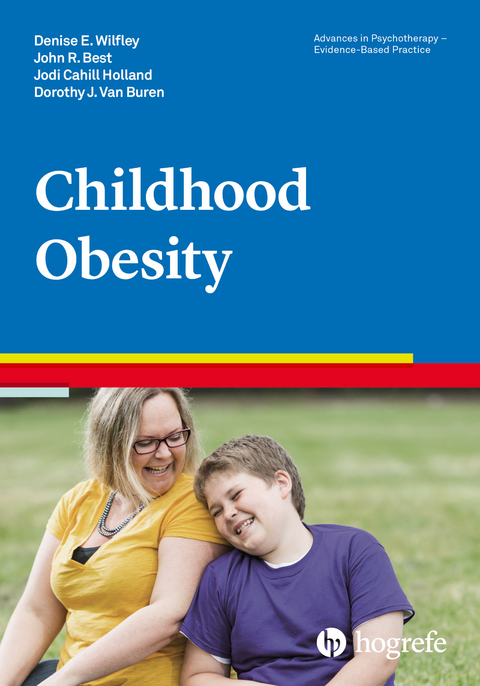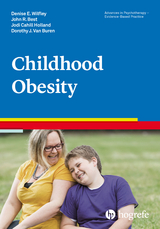Childhood Obesity
Hogrefe Publishing (Verlag)
978-0-88937-406-5 (ISBN)
Clear, up-to-date guidance for professionals working with children with obesity
One in every six children, and more in some ethnic groups, are obese, which can lead to serious health problems in adulthood. Successful treatment of young patients is complex, requiring time-intensive, evidence-based care delivered by a multidisciplinary team. Help is at hand with this well written, compact book by leading experts, which gives health professionals a clear overview of the current scientific knowledge on childhood obesity, from causality models and diagnosis to prevention and treatment. In particular, the authors outline a family-based treatment method which is best supported by the evidence and meets the recommendations of the American Academy of Pediatrics and other organizations. The appendix provides the clinician with hands-on tools: a session plan, a pretreatment assessment form, self-monitoring forms, and a meal planning and physical activity worksheet. This book is essential reading for anyone who works with children and their families, equipping them to guide patients to appropriate and effective treatment.
Denise E. Wilfley, PhD, is the Scott Rudolph University Professor of Psychiatry, Medicine, Pediatrics, and Psychological & Brain Sciences, and Director of the Weight Management and Eating Disorders Program at Washington University School of Medicine. She has dedicated her career to researching the etiology, prevention, and treatment of obesity and eating disorders in children and adults, and to the dissemination and implementation of evidence-based practices into clinical settings. John R. Best, PhD, is a research associate within the Faculty of Medicine at the University of British Columbia in Vancouver, Canada. With a background in developmental psychology, he studies lifestyle behaviors that promote cognitive and brain health across the lifespan, as well as the cognitive, neural, and environmental factors that contribute to healthy choice behavior. Jodi Cahill Holland, PhD, RD, is a registered dietitian. After completing a postdoctoral fellowship at Washington University School of Medicine conducting research in the field of childhood obesity, she relocated to Texas where she is happily applying her knowledge to the raising of her two young children. Dorothy J. Van Buren, PhD, recently retired from the position of Associate Professor within the Department of Psychiatry at Washington University School of Medicine. For the past 27 years she has served as a clinical psychologist, supervisor, and researcher in the field of childhood obesity and disordered eating.
Preface
Acknoledgments
Dedication
1 Description
1.1 Terminology
1.2 Definition
1.3 Epidemiology
1.4 Course and Prognosis
1.4.1 Obesity Tracking Into Adulthood
1.4.2 Future Medical Problems
1.4.3 Premature Mortality
1.5 Differential Diagnosis
1.6 Comorbidities
1.6.1 Phsyical Comorbidities
1.6.2 Psychosocial Comorbidities
1.7 Diagnostic Procedures and Documentation
1.7.1 BMI
1.7.2 Waist Circumference
2 Theories and Models of the Disorder
2.1 Contributions of Child Eating Behavior to
Obesity
2.1.1 Sugar-Sweetened Beverages
2.1.2 Food Away From Home
2.1.3 Breakfast
2.2 Contributions of Child Physical Inactivity and
Sedentary Behaviors to Obesity
2.3 Role of Appetitive Traits in Childhood Obesity
2.3.1 Impulsivity
2.3.2 Motivation to Consume Palatable Food
2.3.3 Satiety Responsiveness
2.4 Behavioral Economics and Obesity
2.5 Family Influences on Weight
2.6 Environmental Influences on Weight
2.7 Genetic Influences
3 Diagnosis and Treatment Indications
3.1 Diagnosis
3.2 Treatment Predictors
3.2.1 Demographic Factors
3.2.2 Family Factors
3.2.3 Psychological Factors
3.2.4 Environmental Factors
4 Treatment
4.1 Methods of Treatment
4.1.1 Treatment Guidelines
4.1.2 Family-Based Treatment
4.1.3 Social Facilitation Maintenance
4.1.4 Pharmacotherapy
4.1.5 Surgical Treatments
4.2 Prevention
4.3 Mechanisms of Action
4.4 Efficacy and Prognosis
4.5 Variations and Combinations of Methods
4.6 Problems Carrying Out Treatments
(Implementation)
4.7 Multicultural Issues
5 Case Vignette
6 Further Reading
7 References
8 Appendix: Tools and Resources
| Erscheint lt. Verlag | 31.8.2018 |
|---|---|
| Reihe/Serie | Advances in Psychotherapy - Evidence-Based Practice ; vol. 39 |
| Verlagsort | Toronto |
| Sprache | englisch |
| Maße | 178 x 254 mm |
| Themenwelt | Geisteswissenschaften ► Psychologie |
| Medizin / Pharmazie ► Medizinische Fachgebiete ► Pädiatrie | |
| Medizin / Pharmazie ► Medizinische Fachgebiete ► Psychiatrie / Psychotherapie | |
| ISBN-10 | 0-88937-406-6 / 0889374066 |
| ISBN-13 | 978-0-88937-406-5 / 9780889374065 |
| Zustand | Neuware |
| Haben Sie eine Frage zum Produkt? |
aus dem Bereich




